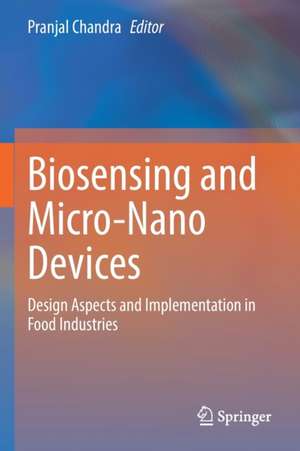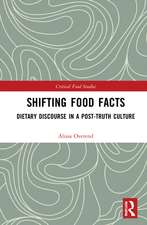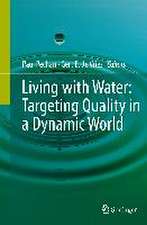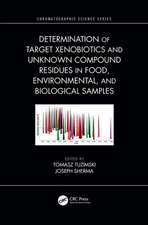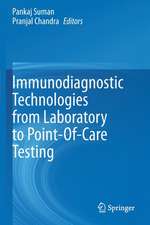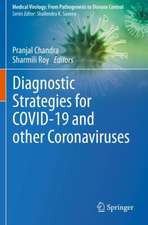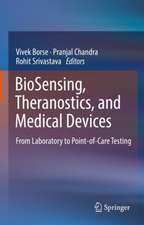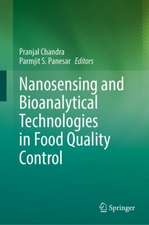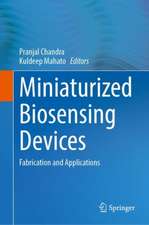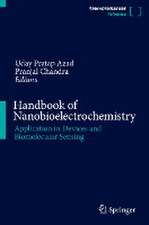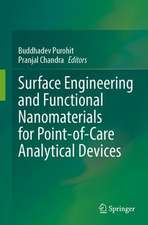Biosensing and Micro-Nano Devices: Design Aspects and Implementation in Food Industries
Editat de Pranjal Chandraen Limba Engleză Paperback – 5 iul 2023
| Toate formatele și edițiile | Preț | Express |
|---|---|---|
| Paperback (1) | 1548.80 lei 6-8 săpt. | |
| Springer Nature Singapore – 5 iul 2023 | 1548.80 lei 6-8 săpt. | |
| Hardback (1) | 1554.17 lei 6-8 săpt. | |
| Springer Nature Singapore – 4 iul 2022 | 1554.17 lei 6-8 săpt. |
Preț: 1548.80 lei
Preț vechi: 1888.78 lei
-18% Nou
Puncte Express: 2323
Preț estimativ în valută:
296.36€ • 308.82$ • 245.39£
296.36€ • 308.82$ • 245.39£
Carte tipărită la comandă
Livrare economică 03-17 aprilie
Preluare comenzi: 021 569.72.76
Specificații
ISBN-13: 9789811683350
ISBN-10: 9811683352
Ilustrații: XII, 360 p. 1 illus.
Dimensiuni: 155 x 235 mm
Greutate: 0.57 kg
Ediția:1st ed. 2022
Editura: Springer Nature Singapore
Colecția Springer
Locul publicării:Singapore, Singapore
ISBN-10: 9811683352
Ilustrații: XII, 360 p. 1 illus.
Dimensiuni: 155 x 235 mm
Greutate: 0.57 kg
Ediția:1st ed. 2022
Editura: Springer Nature Singapore
Colecția Springer
Locul publicării:Singapore, Singapore
Cuprins
Chapter 1. Introduction to Nanobiosensing Technologies and Nanobioanalytical Systems.- Chapter 2. Application of Nanotechnology in Food Analysis.- Chapter 3. Nanoengineered Aptamer Assisted Strategies for the Detection of Food-borne Pathogens.- Chapter 4. Electrochemical Sensors for Food Adulterants.- Chapter 5. Fluorescent Biosensing and Chemosensing Strategies for Food Quality Assessment.- Chapter 6. Optical Detection of Targets for Food Quality Assessment.- Chapter 7. Conventional Technologies and Opto-Electronic Devices for Detection of Food Biomarkers.- Chapter 8. Applications of Intelligent Packaging for Meat Products.- Chapter 9. RFID Near-Field Communication (NFC)-based Sensing Technology in Food Quality Control.- Chapter 10. Advances in Biosensing Technology in the Pharmaceutical Industry.- Chapter 11. Sensor Systems For Drug Analysis and Their Interferences.- Chapter 12. Biosensors for the Detection of Spoilage Levels and Excess Preservatives in Seafood.- Chapter 13. Utilising Big Data as Analytical Tool for Food Safety Applications.- Chapter 14. Aptamer Based Miniaturized Technology for Drug Analysis.
Notă biografică
Prof. Pranjal Chandra is an Assist/Professor at the School of Biochemical Engineering, Indian Institute of Technology (BHU), Varanasi, India. He earned his Ph.D. from Pusan National University, South Korea and did post-doctoral training at Technion-Israel Institute of Technology, Israel. His research focus is highly interdisciplinary, spanning a wide range in biotechnology, nanobiosensors, material engineering, and nanomedicine. He has designed several commercially viable biosensing prototypes that can be operated for onsite analysis for biomedical diagnostics. He is an associate editor / editorial board member of various international journals including Scientific Reports, Sensors International, Frontiers in Bioengineering and Biotechnology, Molecules, Frontiers in Sensors, Green Analytical Chemistry. He is an expert member / reviewer of various national and international funding agencies. He has also been appointed as Advisor for the Biomedical Sensors Domain and Sensor Networks Systems at the Institution of Engineering and Technology (IET), Michael Faraday House, LONDON, United Kingdom. Prof. Chandra is author of over 120 high impact publications including research / reviews papers and invited book chapters. He has published 15 books on various aspects of biosensors/medical diagnostics / material engineering. He has guided 5 PhD and currently he is supervisor of 8 PhD students. Prof. Chandra is the recipient of many prestigious awards, coveted honours, and fellowships such as: Fellow of Indian Chemical Society; Shakuntala Amirchand Award 2020 by Indian Council Of Medical Research; FSSAI: Eat Right Award-2022 (Government of India); DST Ramanujan fellowship (Government of India); Early Career Research Award (ECRA) (DST, Government of India); BK -21 and NRF fellowship, South Korea; Technion Post-Doctoral Fellowship, Israel; Nano Molecular Society India Young Scientist Award; Biotech Research Society India Young Scientist Award; Young Engineers Award 2018; Highly Cited Corresponding authors in The Royal Society of Chemistry (RSC), Cambridge, London; Top 10% cited article in the General Chemistry Section RSC Journal, Cambridge, London, Gandhian Young Technology Innovation Award (GYTI) 2020, etc. Dr. Chandra is also listed among the world’s top 2% scientists in the year 2020 and 2021 by Stanford University, USA.
Textul de pe ultima copertă
This book reviews applications of nanomaterial and nanodevices in the food industry. It also discusses the advanced bioanalytical techniques, including Enzyme-Linked Immunosorbent Assay (ELISA), immunoanalytical techniques, and monoclonal antibody-based immunological techniques for detecting food adulterations and allergens. It comprehensively covers electrode modification and nano-engineered fabrication of biosensors to enhance their functionalities for utilization in food industries. The book highlights the utilization of nanobiosensors for food safety and quality analysis, such as detection of toxin, food-borne pathogen, allergen, evaluation of toxicity etc. Further, it also summarizes the recent advances in nanodevices such as nano-systems, nano-emulsions, nanopesticides, and nanocapsules and their applications in the food industry. Lastly, it covers nanomaterial-based sensors for drug analysis in diverse matrices. It serves as an invaluable source of information for professionals, researchers, academicians, and students related to food science and technology.
Caracteristici
Reviews the application of biosensors in food safety, analysis, quality, control, and processing
Highlights advancements in bioanalytical techniques for the detection of food adulteration and allergens
Presents nano-based receptors for drug and molecular analysis
Highlights advancements in bioanalytical techniques for the detection of food adulteration and allergens
Presents nano-based receptors for drug and molecular analysis
